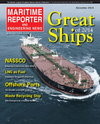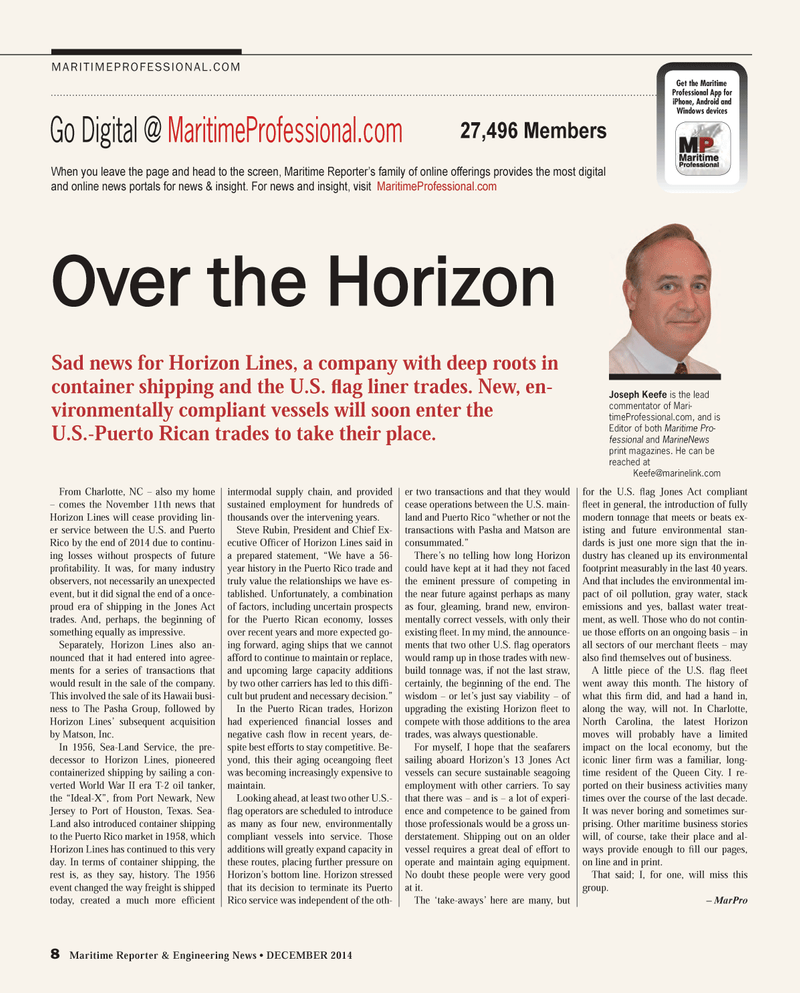
Page 8: of Maritime Reporter Magazine (December 2014)
Great Ships of 2014
Read this page in Pdf, Flash or Html5 edition of December 2014 Maritime Reporter Magazine
From Charlotte, NC – also my home – comes the November 11th news that
Horizon Lines will cease providing lin- er service between the U.S. and Puerto
Rico by the end of 2014 due to continu- ing losses without prospects of future profi tability. It was, for many industry observers, not necessarily an unexpected event, but it did signal the end of a once- proud era of shipping in the Jones Act trades. And, perhaps, the beginning of something equally as impressive.
Separately, Horizon Lines also an- nounced that it had entered into agree- ments for a series of transactions that would result in the sale of the company.
This involved the sale of its Hawaii busi- ness to The Pasha Group, followed by
Horizon Lines’ subsequent acquisition by Matson, Inc.
In 1956, Sea-Land Service, the pre- decessor to Horizon Lines, pioneered containerized shipping by sailing a con- verted World War II era T-2 oil tanker, the “Ideal-X”, from Port Newark, New
Jersey to Port of Houston, Texas. Sea-
Land also introduced container shipping to the Puerto Rico market in 1958, which
Horizon Lines has continued to this very day. In terms of container shipping, the rest is, as they say, history. The 1956 event changed the way freight is shipped today, created a much more effi cient intermodal supply chain, and provided sustained employment for hundreds of thousands over the intervening years.
Steve Rubin, President and Chief Ex- ecutive Offi cer of Horizon Lines said in a prepared statement, “We have a 56- year history in the Puerto Rico trade and truly value the relationships we have es- tablished. Unfortunately, a combination of factors, including uncertain prospects for the Puerto Rican economy, losses over recent years and more expected go- ing forward, aging ships that we cannot afford to continue to maintain or replace, and upcoming large capacity additions by two other carriers has led to this diffi - cult but prudent and necessary decision.”
In the Puerto Rican trades, Horizon had experienced fi nancial losses and negative cash fl ow in recent years, de- spite best efforts to stay competitive. Be- yond, this their aging oceangoing fl eet was becoming increasingly expensive to maintain.
Looking ahead, at least two other U.S.- fl ag operators are scheduled to introduce as many as four new, environmentally compliant vessels into service. Those additions will greatly expand capacity in these routes, placing further pressure on
Horizon’s bottom line. Horizon stressed that its decision to terminate its Puerto
Rico service was independent of the oth- er two transactions and that they would cease operations between the U.S. main- land and Puerto Rico “whether or not the transactions with Pasha and Matson are consummated.”
There’s no telling how long Horizon could have kept at it had they not faced the eminent pressure of competing in the near future against perhaps as many as four, gleaming, brand new, environ- mentally correct vessels, with only their existing fl eet. In my mind, the announce- ments that two other U.S. fl ag operators would ramp up in those trades with new- build tonnage was, if not the last straw, certainly, the beginning of the end. The wisdom – or let’s just say viability – of upgrading the existing Horizon fl eet to compete with those additions to the area trades, was always questionable.
For myself, I hope that the seafarers sailing aboard Horizon’s 13 Jones Act vessels can secure sustainable seagoing employment with other carriers. To say that there was – and is – a lot of experi- ence and competence to be gained from those professionals would be a gross un- derstatement. Shipping out on an older vessel requires a great deal of effort to operate and maintain aging equipment.
No doubt these people were very good at it.
The ‘take-aways’ here are many, but for the U.S. fl ag Jones Act compliant fl eet in general, the introduction of fully modern tonnage that meets or beats ex- isting and future environmental stan- dards is just one more sign that the in- dustry has cleaned up its environmental footprint measurably in the last 40 years.
And that includes the environmental im- pact of oil pollution, gray water, stack emissions and yes, ballast water treat- ment, as well. Those who do not contin- ue those efforts on an ongoing basis – in all sectors of our merchant fl eets – may also fi nd themselves out of business.
A little piece of the U.S. fl ag fl eet went away this month. The history of what this fi rm did, and had a hand in, along the way, will not. In Charlotte,
North Carolina, the latest Horizon moves will probably have a limited impact on the local economy, but the iconic liner fi rm was a familiar, long- time resident of the Queen City. I re- ported on their business activities many times over the course of the last decade.
It was never boring and sometimes sur- prising. Other maritime business stories will, of course, take their place and al- ways provide enough to fi ll our pages, on line and in print.
That said; I, for one, will miss this group. – MarPro
Go Digital @ MaritimeProfessional.com
Get the Maritime
Professional App for iPhone, Android and
Windows devices
MARITIMEPROFESSIONAL.COM
When you leave the page and head to the screen, Maritime Reporter’s family of online offerings provides the most digital and online news portals for news & insight. For news and insight, visit MaritimeProfessional.com
Over the Horizoner the Horizon
Joseph Keefe is the lead commentator of Mari- timeProfessional.com, and is
Editor of both Maritime Pro- fessional and MarineNews print magazines. He can be reached at
[email protected] 27,496 Members 8 Maritime Reporter & Engineering News • DECEMBER 2014
Sad news for Horizon Lines, a company with deep roots in container shipping and the U.S. fl ag liner trades. New, en- vironmentally compliant vessels will soon enter the
U.S.-Puerto Rican trades to take their place.
MR #12 (1-9).indd 8 12/2/2014 11:39:49 AM

 7
7

 9
9
